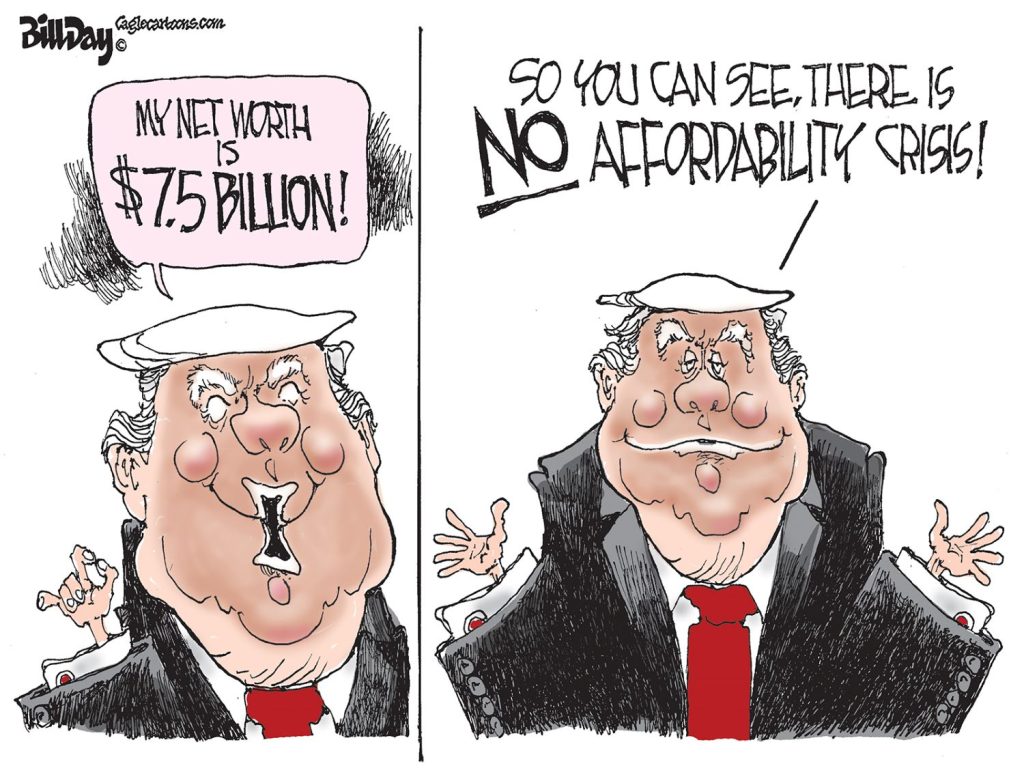It is curious how exorcised we can get when Mississippi picks off a Memphis business for its economic benefit but how mute we remain when a Shelby County town like Collierville or Germantown does it.
The difference between the companies being picked off is stark: the companies moving from Memphis to a smaller city generally have better paying, higher skilled jobs than the ones going south.
Oversimplifying slightly, Mississippi is poaching warehouse and distribution jobs that are essential, but overrepresented, in our economic profile. But since public transit doesn’t connect many of these workers to jobs in Shelby County, we don’t become too upset when the jobs move a few miles away from their present locations (because the underlying need for a car remains the same) and at least Mississippi has to pay infrastructure and other costs that we have too willingly absorbed for jobs here that often pay less than a living wage.
And yet, while we wringing our hands over these kinds of jobs lost to Memphis, we accept the movement of better jobs to the suburban towns.
Memphians Paying For Other Towns’ Economic Success
In October, 2016, Mid-America Apartments LP announced it was moving to Germantown – only a couple of miles east of where they are now – and its 15-year PILOT request called for the waiver of about $3 million in Germantown property taxes and $6.5 million in Shelby County property taxes. The company’s revenues are about $1.1 billion a year.
In April of this year, Mueller Industries announced that it will be moving to Collierville – about six miles east of its present site – and it is asking for a 10-year PILOT from Collierville that waives about $750,000 and one from Shelby County Government that forgives taxes in the amount of $1.8 million. The company has net sales of about $2.1 billion a year.
Meanwhile, in January, 2016, FedEx asked for another 20-year tax break of $75.5 million for its FedEx World Technology Center in Collierville although it hadn’t even finished the 20-year PILOT it already had. FedEx’s yearly revenue is about $15 billion.
But FedEx is just a footnote to the way that Shelby County property taxes are being waived for the benefit of the suburban towns to the detriment of Memphis taxpayers who pay roughly 60% of the total county property taxes. It seems fairer that if Shelby County taxes are to be waived, they should be the ones collected from Collierville.
The M Word
That said, this isn’t about criticizing the companies. They take advantage of policies as they exist and it is the nature of business to minimize costs. They would default on their responsibilities to their stockholders to pass up the easy money.
If there is any criticism, it is on the public sector on our end with policies that have turned these incentives into entitlements and that make the mention of the “M word” – Mississippi – as motivation for a reliable stamp of approval.
Over the years, the Memphis and Shelby County PILOT program have been loosened up because of influence by people with political influence – to allow warehouses to get new tax freezes every time they least to a new tenant and to allow companies to get new “retention” tax freezes as long as they threaten to move out of Shelby County – the “M threat.”
Maybe, we’re wrong and these large corporations would actually pack up and move to Mississippi to have a Southaven headquarters address, and if we are, chalk it up to our own chauvinism. But, somehow, we don’t think Mueller Industries decided not to leave for Mississippi because it got about $2.5 million over 10 years in tax breaks here. On most days, it’s probably got that much in petty cash.
Fishing Downstream
These big fish seemingly get all the attention – and the plums that go with it – while the little fish – small businesses – pay taxes and create most of the jobs. That is the nature of governmental incentive programs, it appears, because there’s nothing like a ribbon cutting or headline announcement to set off hosannas from the political class.
And that’s not to criticize them, because they are responding to the persistent public pressure to show they are creating jobs and attracting new investments when in truth, government does not so much create jobs as create the environment where they can be generated.
All that said, there’s something ironic in watching huge corporations call for government to be more efficient and businesslike while perpetuating a culture in which they require incentives from government, now totaling more than $80 billion a year nationwide.
However, as we’ve said before, this is more than dollars and cents. These are the companies that know us best. Some were born here and some of them moved their headquarters here, and yet, even after all these years, they still lack the confidence in our future that they are willing to contribute their property taxes to support schools, pave roads, fight crime, and create better quality of life.
Instead, they say they are only willing to stay if we give them a tax break that is the equivalent of what they get in revenues every few hours.
A Stronger Justification
It brings to mind a recent meeting where a representative of a major corporation in Memphis was complaining about the quality of schools, but didn’t even connect this to the fact that his employer had a PILOT and did not pay property taxes. We’ve had a similar experience with comments about Memphis crime although the speaker’s employer did not pay property taxes to support police.
A few months ago, I was talking to an Arkansas legislator who was incredulous that his state was considering the reduction of corporate taxes by $100 million as a business incentive. We shook our heads in disbelief, but then I thought, I don’t know why I find this unbelievable because after all, we’re waiving around $75 million a year just in this one county.
We know that no one in economic development circles wants to hear it, but we still think the “but for” justification that was proposed in 2005 by city and county government’s own consultants, URS Corporation and NexGen Advisors, has merit.
In evaluating the PILOT program, which was not nearly as loose then as it is now, the consultants recommended a “but for” requirement, meaning that the company isn’t reasonably expected to make its investment “but for” the public incentive. They said this could be proven by a “gap analysis, a competitive cost analysis for competing sites, or a combination of the two.” “The establishment of a ‘but for’ test is the whole premise of any public investment or the need for it from a logical, moral and legislative standpoint,” they said. “Most, if not all, business incentive programs across the country imply a ‘but for’ test in their intent and enabling legislation.”
That report was shot down almost before the ink was dry, but assuring taxpayers that the incentives they are paying for is smart and reasonable seems a low bar that agencies should be willing to clear in order to garner public confidence.
Paying For Companies To Change Zip Codes
In the meantime, at the least, Memphis should develop strategies to fight to keep its businesses or at the very least fight to keep its share of county taxes from being spent to help companies leave the city.
EDGE must approve the county PILOT but past practice suggests that Shelby County Mayor Mark Luttrell’s approval will be needed first. Then again, if the Shelby County Board of Commissioners were concerned about this trend, it could pass a resolution stating the will of the commission.
As former Shelby County Mayor Jim Rout said in the late 1990s when confronted with the first of these kinds of requests by a Memphis company moving to Collierville, “There’s no reason for county government to give up county taxes for a company that’s just changing zip codes in Shelby County.”
His comments made sense then and make even more now.
**
Join us at the Smart City Memphis Facebook page for daily articles, reports, and commentaries relevant to Memphis.







Can we honestly blame these companies for seeking greener pastures? With all of the problems that exist in the city of Memphis it’s no wonder companies will seek out locations where there is the possibility of having lower taxes as well as a better environment in which they can do business.
Just sticking to your normal talking point. Mueller was in Southwind, that hotbed of crime.
Fred Smith is no fool either. He will do anything to boost the bottom line of FedEx even at the expense of his “beloved” Memphis.
Can’t blame a company for wanting to save on taxes. Can also fully understand why they would choose to leave Memphis. Could be much worse if we had some really valuable large important tech companies here, but that’s not the case with distribution companies.
These aren’t distribution companies. That was the point we were making.
How is it saving on taxes if it’s not paying any? And will they move again to get a new one or ask for a “retention” PILOT?
Anonymous, are you listening or do you just want to post comments to yourself all day? They are living on the fringes of east Memphis. Exactly what are all those problems with their environment? You are embarrassing yourself grasping at straws.
These are the type of know nothing comments from someone who never reads the actual piece they are commenting on that is making the comments section on this blog intolerable.
Blah blah “all the problems in Memphis” blah blah “greener pastures” blah blah.
It matters not the topic we getting the types of comments that ruined the CA comments section.
I actually enjoy reading smart, knowledgeable commenters but they have been chased away. And that’s a shame.
all comments are good. not everyone is an expert.
I would point out to the Commissioners how corporate welfare is at odds with traditionally conservative principles. If we center the argument around Memphis, they will likely defer to pro-suburban, anti-Memphis sentiment, and preserve current policy.
Collierville and Germantown are doing this to attract new residents. In time, employees move closer to work and pay property taxes there. What is Memphis doing to attract new residents?
So Collierville and Germantown are able to attract businesses that don’t pay their “fare share” of taxes, and somehow they are still able to maintain quality schools. With no taxes? How is that possible Smart City Memphis? Maybe you’re not as smart as you think you are.